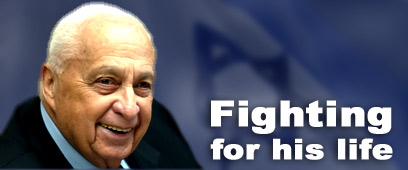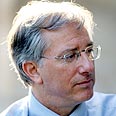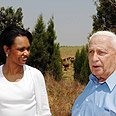


In his long career as military leader, diplomat and finally prime minister, many U.S. officials who worked with Sharon over the years found him unyielding in opposing compromise with the Palestinians and other Arabs.
Eventually, he broke with his more conservative political backers and accepted the principle of a Palestinian state, pulled out of Gaza and turned the territory over to the Palestinians.
Former Secretary of State Madeleine Albright said she was surprised at the transformation, based on her dealings with Sharon, then the foreign minister, at U.S.-hosted peace talks on Maryland's Eastern Shore in 1998.
"He was one of the toughest for us, and he did not want to deal with the Palestinians and saw them as people that have blood on their hands," Albright recalled in an interview.
Albright, who served under President Bill Clinton, said Sharon refused at a dinner to shake hands with the late Palestinian leader Yasser Arafat.
"Arafat put his hand out and Sharon would not do it, so Arafat gave him a kind of salute, and Sharon did not respond," Albright said.
Sharon, she said, "spoke about the Palestinians as if they were not there. It was a very tough meeting."
In the negotiations themselves, she said, "He used very salty language."
Opposed treaties
Philip Wilcox, the U.S. Consul-general in Jerusalem from 1988 to 1991, recalled Sharon's opposition to several peace efforts. These included the Camp David accords that led to the 1979 Israeli-Egyptian peace treaty, the 1993 Oslo accords that set a framework for peace with the Palestinians and the 1994 peace treaty with Jordan.
"He did not believe in peace with the Arabs," Wilcox said. "I always thought his reliance on force and his
reliance on the settlements movement was a disaster for Israel."
Wilcox said he was convinced Sharon never changed - a viewthat other U.S. Officials contested.
Dennis Ross, who helped shape national security policy under President George H.W. Bush and negotiated for Clinton, said he was impressed with Sharon's interest "in the larger picture, where things were headed."
"I (told him) the important thing is sometimes you have to be prepared to come up with something that is extremely different," Ross recalled. "He immediately grasped that. He said, 'we cannot just split the difference with the Palestinians, we have to find a different way of solving the problem."
Sandy Berger, Clinton's national security adviser, remembers Sharon visiting his office in the White House and spreading maps on the floor to point out which Israeli settlements were vital to Israel's security. Sharon was a leading force in sending Jewish settlers to the West Bank and Gaza, despite pleas by U.S. administrations that they hindered peace prospects with the Palestinians.
In an interview, Berger said he got on the floor with Sharon, who was then out of office, and pondered with him.
"This is a man of iron will," Berger said. But he added that Sharon also was a leader whose thinking evolved in response to the Palestinian uprising.
Onset of change
Sharon began to change with the onset of President George W. Bush's administration five years ago. As he evolved, he meshed with Bush's aspirations to establish a Palestinian state living alongside Israel in peace.
The fact that Bush supported Sharon by shunning Arafat and demanding an end to violent attacks on Israel helped in the prime minister's transformation.
Current Secretary of State Condoleezza Rice also touched on Sharon's capacity for change.
"While his vision of peace was based on a basic commitment to Israel's security," she said, Sharon also had a "growing realization that security has to include a better future for the Palestinian people."
Further underscoring the view that Sharon had evolved, a pair of diplomats who worked for past Republican
administrations said his departure from the scene would bode poorly for efforts to bring calm to the Middle East.
"It was Sharon and Sharon alone who was driving" efforts toward peace, former Secretary of State Lawrence Eagleburger told reporters in the White House driveway after he and other ex-U.S. officials met with Bush.
"It'll go back to politics as usual," said former Secretary of State Alexander Haig, standing alongside
Eagleburger.















